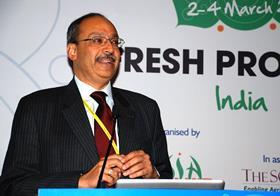
The Indian government has approved long-awaited proposals to open the retail market to global supermarket chains. Do you think the move will go ahead given the likely effort to block it from political opponents and the strong lobby of small businesses?
AS: The government has been deliberating over this issue for many years, and is expected to be fully aware of the opposition and the strong lobbying effort against this move from the small retailers. If they have, nevertheless, taken the decision to bite the bullet now, I believe that the government would be confident that its decision would go through.
When do you think the proposal will take effect?
AS: The decision does not have to be ratified by any act of Parliament. The government would just notify its policy decision through a Press Note (which could be issued through the Department of Industrial Policy & Promotion DIPP) – and this could happen within the next three of four weeks.
What kind of conditions do you expect there to be for foreign investors in terms of commitments to local sourcing or levels of investment. Do you see some significant hurdles or restrictions here?
AS: The fine print would be clear only when the government note is notified but I believe that local sourcing and other riders could at worse represent some irritants and may require some tweaking of sourcing and supply chain development strategies. By and large, whatever has been reported in the media relating to the specific riders, there is nothing that seems like a major hurdle.
Assuming it goes ahead, what is the move likely to mean for all key parties in the fresh produce supply chain, from producers to consumers?
AS: I think modern retail offers very significant opportunities for all those involved in the fresh produce value chain – from the farmer to the processors, and then the cold-chain and logistics operators – to offer better “read – fresher” product to the consumer at competitive or even lower prices than what is currently available to the consumers through the existing wet markets, street hawkers and other vendors.
What effects do you see for India's fresh produce business overall?
AS: Ibelieve that the opening of FDI in retail will see a much-needed thrust in terms of the fresh produce production and movement activity, and the rise of new entrepreneurial opportunities at every segment of the chain from farm to the consumer. Overall, the business will see more consolidation, more professionalism, and more transparency in operations.
Do you have any other important comments or observations to make at this stage?
AS: I would only mention that notwithstanding the current clouds hanging over the global and even the Indian economy, India will remain one of the fastest and one of the more steadily growing large economies in the world. In the short-term, some of the global companies who may have an interest in looking at India may find doing business somewhat frustrating and confusing. I am confident that those who can show some patience and some creative determination will find their efforts well-rewarded.
Arvind Singhal is chairman of Technopak Advisors, one of India’s leading management consulting companies with specialist expertise in retail and consumer markets.



